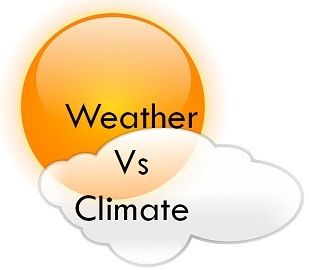 Weather plays a significant role in our lives, as most of our day to day activities are planned according to the forecasting made by the meteorological department for a particular day. It is the intricate phenomenon, which demonstrates changes over very short periods of time, in the atmospheric condition at a given region. On the contrary, climate indicates the weather pattern of a particular place, taken over a long time.
Weather plays a significant role in our lives, as most of our day to day activities are planned according to the forecasting made by the meteorological department for a particular day. It is the intricate phenomenon, which demonstrates changes over very short periods of time, in the atmospheric condition at a given region. On the contrary, climate indicates the weather pattern of a particular place, taken over a long time.
Often perceived as being the one and the same thing, these two terms are actually different that are closely related to each other. There is difference between weather and climate, regarding the time length and the factors affecting them. So, read out the article to have a better understanding of the two terms.
Content: Weather Vs Climate
Comparison Chart
| Basis for Comparison | Weather | Climate |
|---|---|---|
| Meaning | Weather is everyday atmospheric condition of a particular region, as regards temperature, humidity, wind speed, etc. | Climate alludes to standard pattern of weather of a particular place, taken over more than 25 years. |
| What is it? | Minute by minute state of atmosphere in an area. | Average weather in a region. |
| Represents | What are the condition of atmosphere in a geographical location, over short period. | In what way atmosphere acts over typically long period. |
| Variation | Varies constantly. | Does not vary constantly. |
| Affected by | Temperature, humidity, air pressure, cloudiness, precipitation etc. | Temperature and Precipitation. |
| Assessment | For short term | Over a long period |
| Study | Meterology | Climatology |
Definition of Weather
Simply put, weather denotes the daily atmospheric condition, concerning various elements like temperature, precipitation, moisture, cloudiness, wind velocity and air pressure. It expresses the position of the atmosphere at a specified place and time, in degrees, i.e. hot or cold, clear or cloudy, dry or wet.
It constantly changes, i.e. hour after hour and day after day. Weather forecasting is the difficult task, as many times, it happens that on a sunny day, suddenly heavy rains occur or the sunshine occurs immediately after heavy rains.
The Sun is the fundamental cause of changes in weather because it is the primary source of energy to earth. The energy absorbed and emitted by the earth’s atmosphere, surface and oceans have a great role to play in ascertaining weather of the region. Moreover, winds and storms also result in the changes in weather.
Definition of Climate
The term ‘climate’, is used to mean weather trends at a specific region, over the course of many years. It is the statistical information of weather which signifies that common atmospheric pattern, in an area over decades, i.e. it does not indicate the weather changes occurring daily or weekly. So, when we observe that the temperature of a country is highest, then it means the climate of the place is very hot.
The climate of a place is greatly affected by two factors, which are temperature and precipitation, and other factors influencing it includes wind velocity, the sunshine, precipitation timing, humidity and so on. The standard length of time used to ascertain the climate of an area is 30 years.
Key Differences Between Weather and Climate
The points given below are substantial so far as the difference between weather and climate is concerned:
- Weather is the routine atmospheric condition of a specific region, as regards temperature, humidity, windspeed, etc. On the other hand, climate implies the standard pattern of weather of a particular place, taken over a period.
- Weather is the moment-wise state of the atmosphere of a geographical area. As against this, the climate is the average weather in a given region.
- Weather is the condition of the atmosphere in a given region, over a short period. Unlike climate which refers to the way, atmostphere behaves, over the typically long period.
- Weather of a place can change in few hours or even in few minutes, i.e. it changes frequently. However, the climate of a place takes several years to change, and thus it does not change frequently.
- Weather is greatly affected by factors like temperature, humidity, air pressure, cloudiness, precipitation, etc. On the contrary, temperature and precipitation are the two key factors which influence climate.
- While the weather is assessed for a short period, i.e. for day or week by the meteorological department. Conversely, the climate is assessed over the course of many years.
- The study of weather is called meteorology whereas climatic study is termed as climatology.
Conclusion
To sum up, we can say that weather is nothing but how a specific region feels at a particular moment. The data for ascertaining weather are recorded at a particular time. On the flip side, the climate is the general weather at a particular place, i.e. the aggregate of weather components recorded over a long period.






gabriella says
useful
Sultan Hasan says
Good
Yogejs says
It’s helpful
Vania says
Thank you! It was helpful!
gage says
very useful